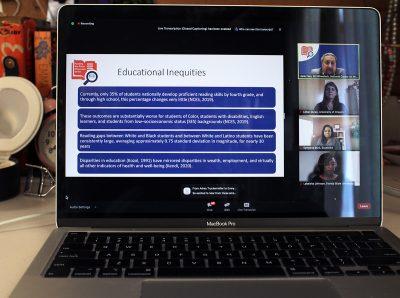According to the 2019 National Center for Education Statistics report, “only 35% of students nationally develop proficient reading skills by fourth grade,” Hank Fien, the director of the National Center on Improving Literacy at Wheelock College of Education and Human Development, said at a panel on Feb. 23.

Educational inequities in reading exist in many communities nationwide, especially for students with disabilities and those in marginalized communities. To discuss this issue, Wheelock hosted a panel with the National Center on Improving Literacy titled “Shining a (Glaring) Light on Educational Inequities in Reading.”
The panelists included Lillian Duran, associate professor and associate dean for academic affairs in the College of Education and Special Education Program at the University of Oregon, Kymyona Burk, a senior policy fellow at ExcelinEd and Lakeisha Johnson, assistant professor in the School of Communication and Information at Florida State University.
“Disparities in education have mirrored disparities in wealth, employment and virtually every positive indicator of health and well being,” Fien, who was also the panel’s moderator, said at the event. “There are many reports that indicate that state’s project building prisons based on fourth grade reading tests.”
What has stood in the way of implementing solutions to combat the literacy gaps for marginalized students is, “number one, [schools were] never intended to serve these populations, number two, it takes a will of the people,” Duran said in an interview.
“You can have all of the evidence in the world but if we don’t have philosophical shifts, if we don’t directly address racism and the disparities in our school systems … then we really can’t implement evidence based interventions in some sort of vacuum,” Duran said. “There has to be the infrastructure, the will and the philosophical perspective that prioritizes the changes.”
Duran also said the challenge is to “reinvent” how US public schools serve bilingual and multilingual populations and to move away from the English only approaches.
Despite assessments having “a bad rap” when they are designed correctly to give educators information around adapting to fit students’ needs, they are in fact valuable, she said.
“Assessments are the skeleton of our educational system,” Duran said. “They really provide the framework on which we build our knowledge about student ability levels, where we need to meet students, how we determine whether or not what we’re doing is effective.”
Johnson said in an interview that she thought the panel “went extremely well” because the discussion wasn’t another talk just identifying the issues, they also made headway into potential solutions.
“The first thing is just ensuring that there’s high quality literacy instruction happening in classrooms,” Johnson said. “So our teachers, our educators, all professionals working with children have a strong understanding of the science of reading and they’re fully equipped with being able to provide high quality instruction.”
The panel also discussed the science of reading — research that has been collected over time from multiple fields about how children learn to read best and how to assess them.
“The science of reading is not an intervention or product to go get on Amazon or Pearson,” Johnson said.
Burk, who has worked closely with policy related to education in Mississippi, said at the event when states make really bold stances and incorporate the science of reading into state law, changes can be made locally “because that’s where the rubber meets the road.”
David Chard, dean of Wheelock and a professor of special education, said the purpose behind this panel and the series was also to provide evidence-based solutions to reading-related disabilities such as dyslexia and focus on “historically marginalized groups in public education.”
“I think it’s important for people to understand that dyslexia is a real thing that learning to read for a fairly sizable proportion of the population is not easy,” Chard said. “It might be easy for many people, but it’s not easy for everyone, and it remains an essential part of our development as human beings because it’s the way we communicate with one another.”
He also said that, in a state like Massachusetts that prides itself on its education outcomes, many of the students, mostly Black and brown students from high poverty backgrounds, are “not benefitting.” He said this should be a “call to action.”
“We need to change, we need to be open to this change and to radical shifts, not minor shifts, but really radical shifts in this area, where we recognize these students’ needs and understand that over the last 30 years, what we’ve been engaging in has not been working,” Duran said at the panel. “And finally acknowledging that language is a civil right.”















































































































